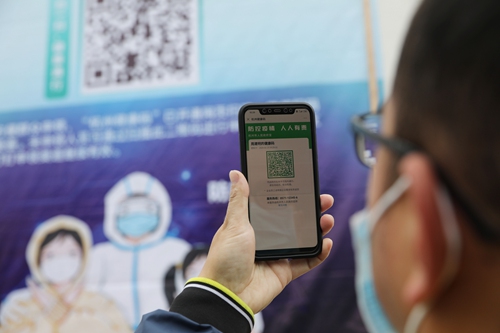HOME >> CHINA
Big data, grid management support disease control in Quzhou
By Shan Jie Source:Global Times Published: 2020/2/16 18:18:41

A villager scans the QR code to register his health condition in Tianmushan town, Hangzhou of East China's Zhejiang Province on Saturday. Photo: cnsphotos
"Did you come to Quzhou from Wuhan by train on January 23?" a Quzhou resident, surnamed Luo, was asked in a phone call from a local "grid management administrator," who is responsible for disease control in his specific community block.Luo did not report his trip from Wuhan, the epicenter of COVID-19, to his community after he arrived at Quzhou in East China's Zhejiang Province. However, the Quzhou Big Data Administration found out about Luo's trip and reported it to the government.
Luo was sent to quarantine and was confirmed infected with the novel coronavirus pneumonia.
"We use big data to find, quarantine and treat in advance. We have seized the initiative of the battle to prevent secondary transmission as much as possible," said Zhang Gang, chief of the big data administration, according to the Guangming Daily.
There are other cases like Luo's that happened in Quzhou during the epidemic. The city's smart city building plays a key role in its disease prevention and control. Citizens can even apply for a birth certificate for babies through mobile phones.
Quzhou has led smart city building over the past few years. In April 2018, the city published a plan to promote smart city construction. In 2019, it became the model base of smart city industry in the Yangtze River Delta, a vital region for China's economy and technology innovation, the Qianjiang Evening News reported.
On Friday, "health code," a newly-developed online prevention system, was launched in the city. People entering Quzhou have to register online to report their status, according to the Quzhou government.
These people are divided into three groups - those given a "red code" by the system must be quarantined in hospital; those with a "yellow code" must self-isolate at home for 14 days; getting a "green code" grants access to the city.
People given a "red code" are confirmed or suspected patients of COVID-19, those who have close communication with patients or traveled to Hubei Province.
Wang Rangding, director at the Southeast Digital Economic Development Institute under Quzhou Big Data Administration, said that Quzhou's "Xueliang project" is also serving the epidemic prevention. The project uses facilities and technologies such as big data and surveillance cameras to safeguard and convenience people.
Wang said some conflicts exist between the need for disease prevention and personal privacy, but it is necessary to apply certain measures currently.
He noted that using big data is actually much safer than other methods, because the operators and the government would ensure data security in the processes of operation.